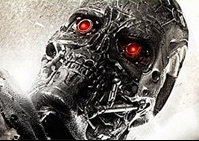Analytics in 40 years: Machines will kick human managers to the curb

In the next 40 years analytics systems will replace much of what the knowledge worker does today. In other words, systems like IBM's Watson will be your boss and humans---especially the species known as middle management---will go extinct.
That's the conclusion of Gartner analysts Nigel Rayner. In a "maverick" presentation, Rayner argued that many of the things executives do today will be automated. A maverick presentation is one that makes a case for an outcome that isn't a sure bet. Rayner, who described the intersection of analytics, economics and business as "a personal journey," certainly was thought provoking.
Here's gist of what you have to look forward to in 40 years.
We are at a tipping point in the evolution of the "Information Age," but business culture is holding back the use of IT. In the future, decision making will be automated and managed by machine-based models far better than any human could manage. Effectively, most of what the CFO, CEO and managers do today will be done better by machines. This will have profound impacts on business, society and the economy. In the short term, the bonus-maximizing behavior of CEOs and management teams will be replaced by an "enlightened capitalism" in which shareholders tell machines how they want their business to operate.
The other jarring conclusion---at least for all the humans in the room---was that we stink at rational decisions. In addition, compensation packages, peer pressure and other nonsense simply distort good decision-making. Machines simply do a better job. Humans can't process information overflow, short product cycles and the pressure to deliver results. "The way we have evolved means that humans don't make rational decisions," said Rayner. "We're not hardwired to be rational. And even if we were, the current environment and the pace of business would make it hard for executives to balance short-term and long-term needs."
Humans overestimate their abilities and glorify the past and those characteristics result in poor decisions. Machines are better than humans at clinical diagnosis, targeting profitable customers, hiring employees and predicting the wine harvest. "Everywhere I look in behavioral modeling, machines outperform humans," said Rayner.
Enter your friendly neighborhood supercomputer---which will be run-of-the-mill in 40 years.
Rayner added:
In the world of business, profitability modeling and optimization applications are identifying previously unknown sources of profits, while statistically-based validated assessments can be more effective for hiring than human managers.
And it's already happening since predictive models are already maximizing profits throughout business. Machines do talent assessment and predictive modeling better already. Pattern-based analytics is the next arms race for technology giants. Just imagine how swell these systems will be in 40 years.
Our end state will be intelligent operations systems and models that will automate companies and the processes that run them. Machines will be the rational brains of business. Humans will do what we do best: Building new services, pondering risks and innovating. In other words, humans will be more strategic thinkers and think about potential Black Swans and tweak models accordingly.
As one of the lowly humans in the room, I couldn't help but wonder about the unemployment line in 40 years. Yes, I'll be a bit over the hill by then, but if you assume the retirement age goes to 95---the only way Social Security will be solvent---this Gartner argument is downright scary to me. Machines are already automating humans out of the way in many industries.
The kicker is that the collective will be in charge of decision-making. Rayner noted:
Most routine management tasks will be eliminated. Instead, the focus will be on innovation in products, services and business models — activities that are much better suited to the human mind (especially the subconscious one). In the world of IT, skills in economic and social modeling will be highly valued.
Sounds great eh? The "John Connor counterpoint" is that all this leisure time and focus on higher-level tasks---since the machines will do everything---will make humans soft. For instance, airline pilots depend on machines so much that they barely know how to manually fly. In this world, we potentially won't be able to innovate, reason and run a business because we'll lose our edge. Collective intelligence and machines will trump the next Steve Jobs.
